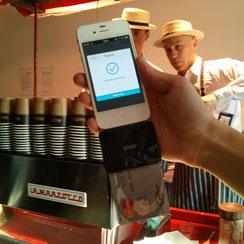iZettle and the modernisation of money
- Published
- comments

Wednesday could see another important step towards the modernisation of money. iZettle, a device that allows small traders to take credit card payments, is arriving in the UK after a successful rollout in other markets. But a failure by big payment firms to agree common standards on how we use these mobile money systems could mean the whole idea fails to fly.
iZettle is a small card-reader that plugs into iPhones, iPads and a number of Android smartphones or tablets. It is designed for use by any small trader who can't afford the infrastructure needed to take credit card payments. You hand over your card to the stallholder - or plumber or window-cleaner - it is swiped through the device, and then you sign for your purchase. The merchant pays a commission of 2.75% a transaction, and the consumer gets to use their plastic rather than cash in new places.
I tried it out at a launch event and it worked pretty smoothly. A scented candle manufacturer told me she had been using a trial device for some months, and had found it was an excellent way of taking payments at craft fairs.
iZettle was launched in Sweden a year ago, and according to the co-founder Jacob de Geer, it is now used by more than 75,000 small businesses and individuals in six countries. In Sweden, he told journalists at the launch, 700 blacksmiths are using the device. "It's bringing new merchants to the table. My ambition is to democratise card payments."

Payments with Mastercard and American Express are quicker than with Visa cards
The big question in the UK, though, is whether consumers will fancy the idea of having their cards swiped into this device. And here there's a hitch. There are big names backing iZettle including the mobile operator EE, and the payments firms Mastercard and American Express.
But the other major force in the card industry, Visa, is an investor in a much bigger player in the mobile payments area. Square, started by the Twitter founder Jack Dorsey, is making rapid progress in the United States market and is now valued at something over $3bn.
And what people couldn't help noticing at the iZettle launch event was that paying with Visa was a lot harder than with other cards. Whereas with Mastercard or American Express the consumer just presents their card and signs, Visa users had to hand over their phone numbers and tap in security details on their own phones.
It seems that Visa is not too keen on the "chip 'n' signature" security that iZettle uses, even though the Swedish company says it has a lower fraud rate than for chip and pin transactions. When I asked Visa about the issue, the company sent me this statement: "We're continuing to work with iZettle to develop a fully Visa Europe compliant mobile point of sale solution."
The trouble is that any kind of friction in a mobile payments system is annoying and will lead many to conclude they are better off sticking with cash.
There are now lots of different mobile payment technologies from all sorts of companies, but they all seem to have different ways of verifying who customers are. But with little evidence of any great enthusiasm for mobile money - unless it makes life easier - surely it is time for the payments industry to get its act together and agree some common standards.